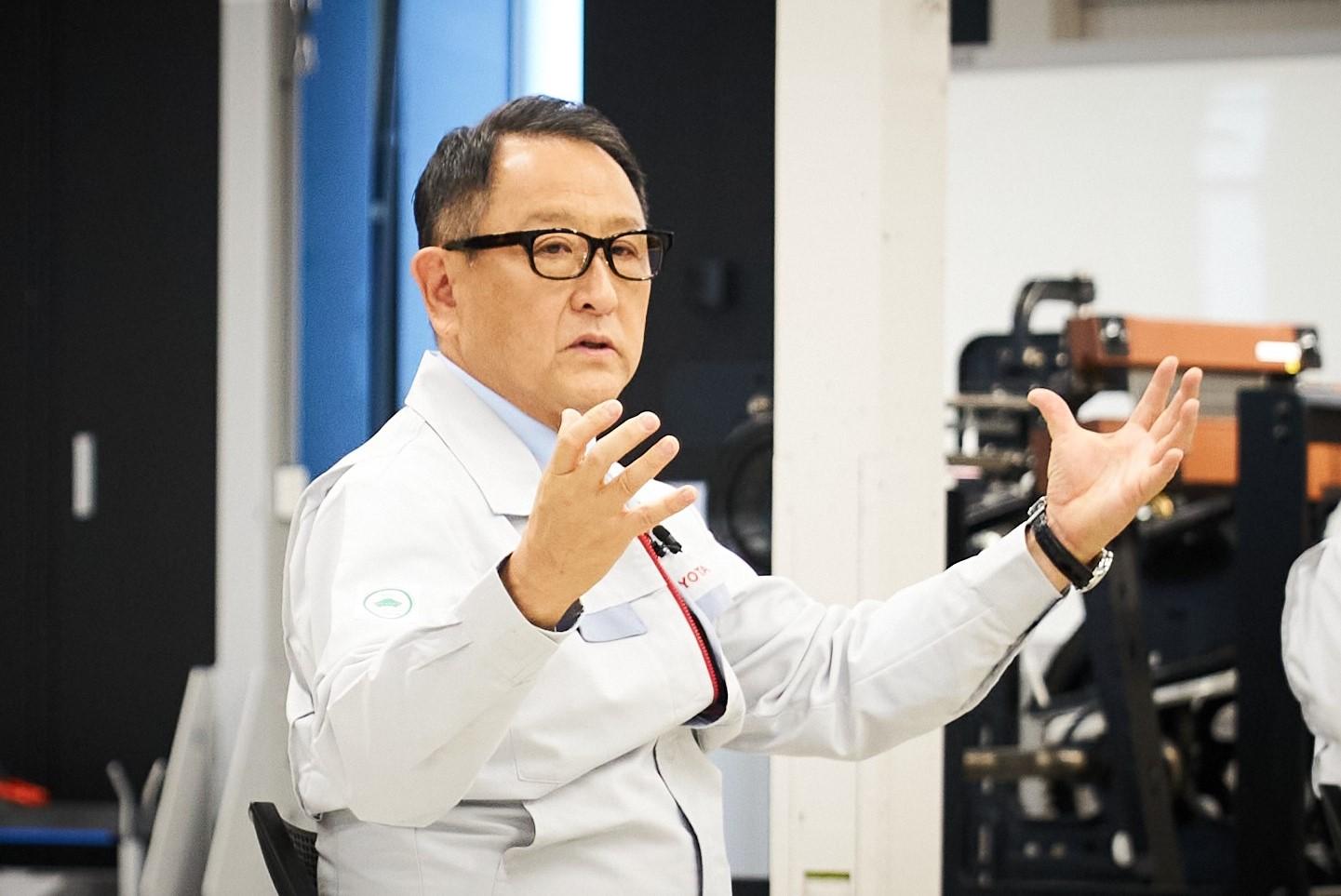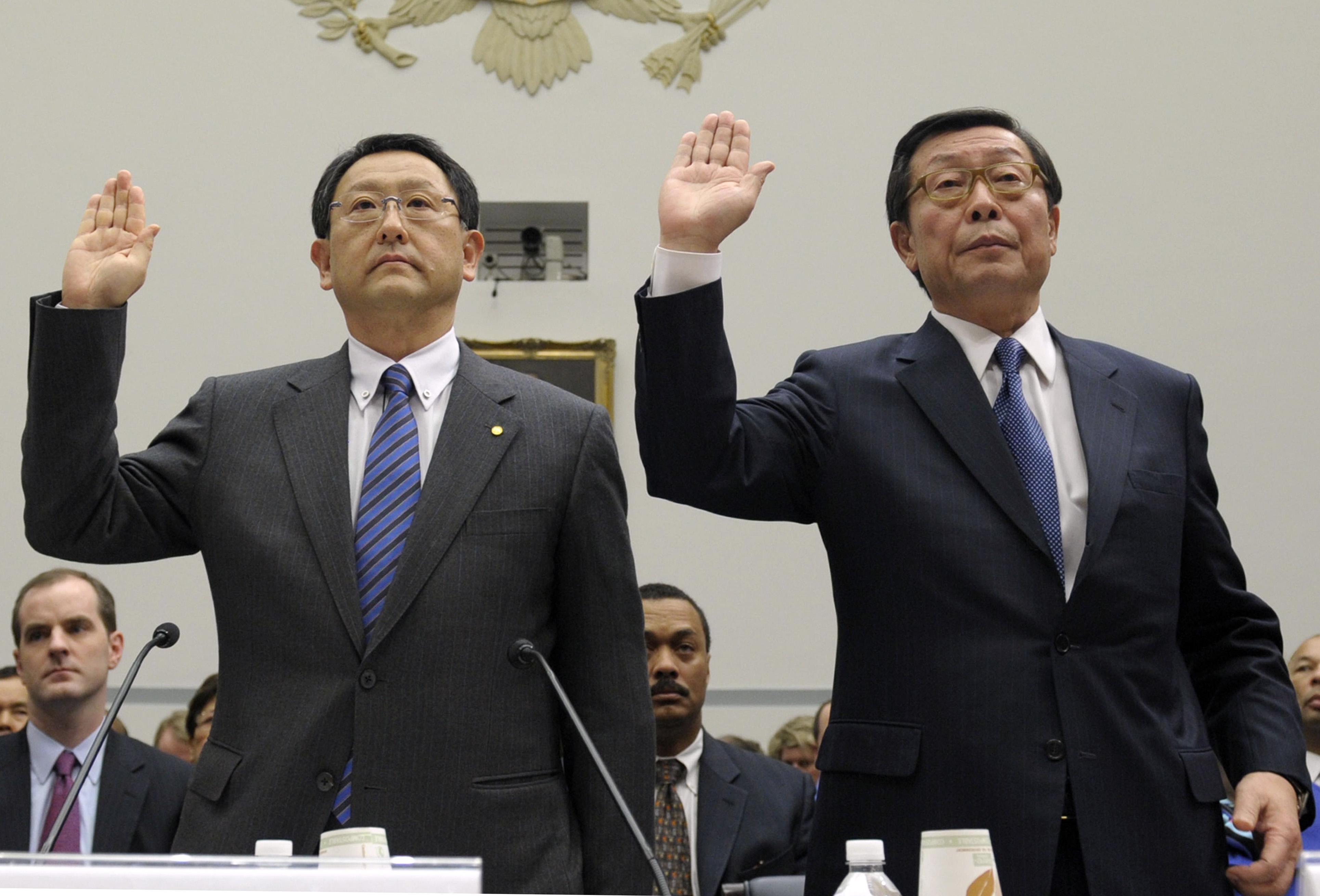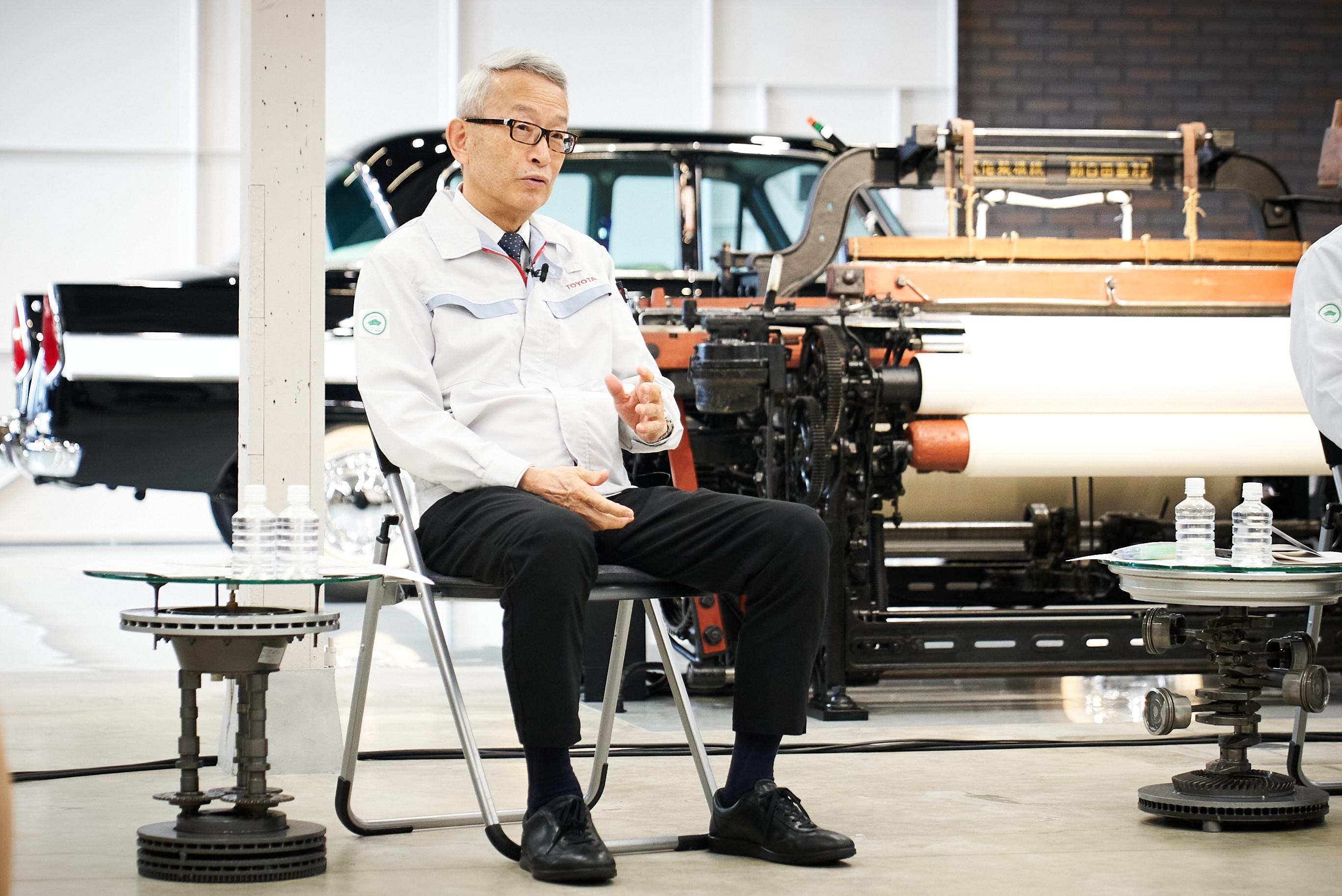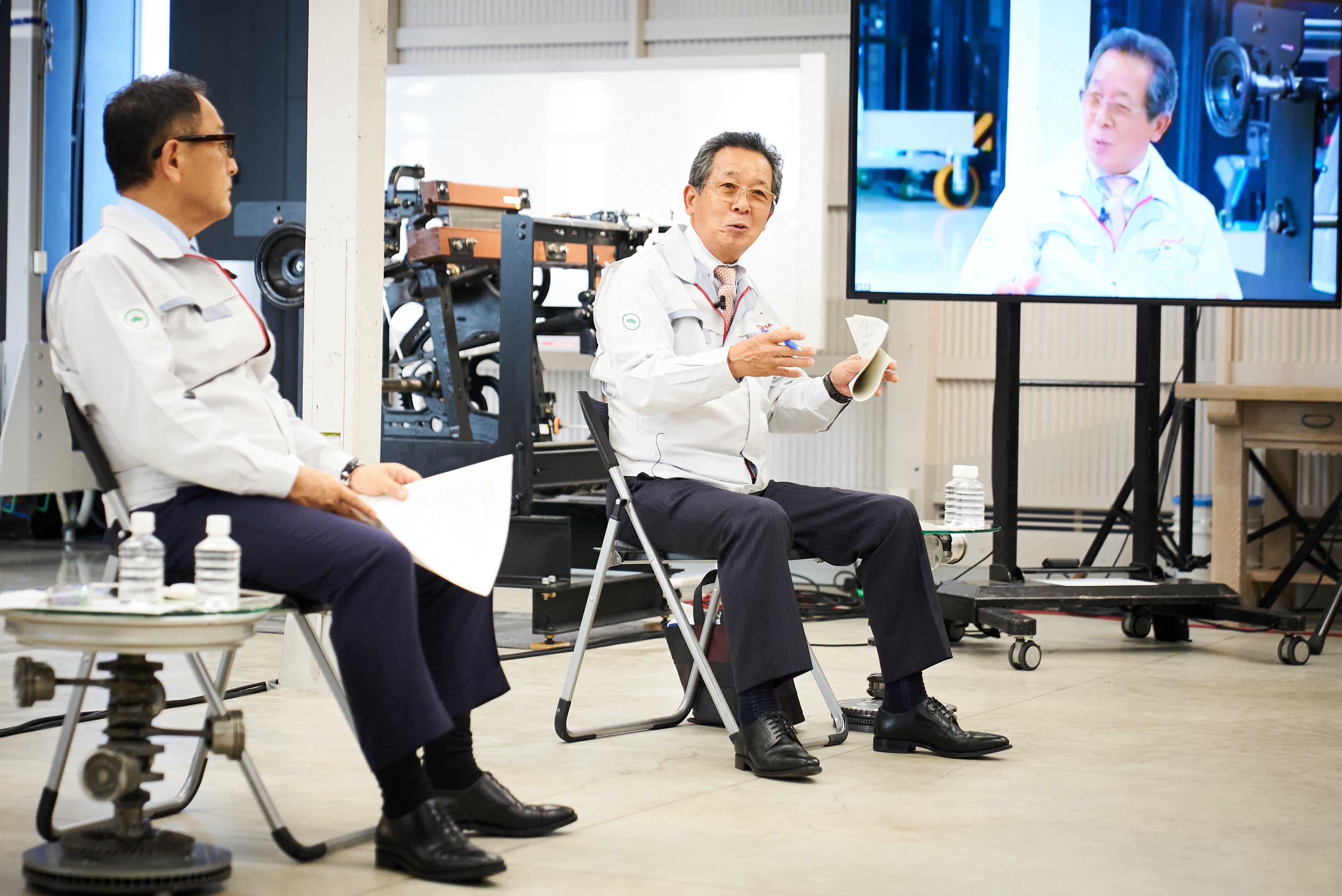
President Akio Toyoda attended this year's 56th All-Toyota Total Quality Management (TQM) Competition for the first time in six years. This article looks at what inspired him to attend of his own accord.

There was a special event named Akio Toyoda’s Juku (roundtable with team members) on Quality on November 16 as part of the 56th All-Toyota TQM Competition.

TQM stands for Total Quality Management. The Union of Japanese Scientists and Engineers defines it as being “a set of systematic activities carried out by the entire organization to effectively and efficiently achieve the organization’s objectives, so as to provide products and services with a level of quality that satisfies customers, at the appropriate time and price.”
It means to value not only the quality of products and services, but also the quality of work and administration.
Toyota started the All-Toyota Quality Management Competition in 1966, along with affiliated companies and suppliers, as well as dealerships, to ensure thorough quality control. It evolved into the All-Toyota TQM Competition in 1995.
TQM is defined as activities to improve the vitality of individuals and organizations in striving to boost the quality of corporate activities, based on the three principles of “customer first,” “kaizen (continuous improvement)” and “total participation.”

Toyota executives and outside administrators normally give speeches and hold discussions on quality at TQM Competitions, but this year, those were replaced by Akio Toyoda’s Juku (roundtable with team members) on Quality, where President Akio Toyoda talked about his philosophy and values toward quality.
This was because various quality- and trust-related problems occurred at Toyota this past year, including improper motor vehicle inspections and inappropriate handling of personal information.
Faced with this crisis, Akio realized there was a need for him to produce and attend the event himself for the first time in six years to give a speech in his own words about his philosophy and views as the head of the company.
People were not invited based on their titles, rather, anyone truly interested in hearing his speech could attend. A digital tool was used to gather and vote for questions for Akio in advance, so that he could answer the most popular questions from participants.
Inviting Koji Kobayashi (Operating Officer) and Mitsuru Kawai (Executive Fellow) to join him, Akio himself played the role of an MC. He coordinated the two-hour online event, attended by 5,000 people mainly from Toyota Group companies, suppliers and dealerships, without a script or prompter.
An event on quality may sound stuffy, but most of the discussions revolved around smooth operations and work quality, such as workplace communication and dealing with failure.
This two-part article will cover all the topics Toyota Times readers are sure to find interesting.
Question 1: Can we have honest communication?
Questions that received the greatest number of votes among the participants this time mostly referred to “honest talk,” which at a glance may not seem to have much relevance to quality.
Akio talked about his views in reference to the recall crisis in 2009-2010, during which he had no choice but to be totally forthright about his thoughts.
- Do you think we can honestly speak our minds? We sometimes hesitate to be completely straightforward in sharing our honest feelings and thoughts, after thinking about all the obstacles involved. What does “honest talk” really mean?
Akio
“Honest talk” means you share your true feelings or views, while “tatemae” (smoothed-out communication) is an indirect way of pointing out differences between your views and those of others without causing friction.
So, is “tatemae” lying? Lying is when you give false information with the aim of deceiving others.

I faced an incident which forced me to confront my true feelings soon after I became president of the company, when I had to attend a public hearing in the U.S. over the recall problem.
In doing so, I vowed not to run away, not to lie, and not to distort the truth. That’s what I told myself before heading to the U.S.
The company had prepared testimony for me to read in the three weeks after I decided to attend the public hearing. The defense was built on the conclusion that Toyota’s head office in Japan was to blame.
But this was an ineffective defense because I was testifying as president of the company’s head office. So, I prepared my own testimony based on a public hearing simulated with our lawyers.
My basic policy was to admit that I was to be held accountable. I was asked, “Were you aware of the problem?” and I answered, “No, I wasn’t. But I am accountable for it.”
I’d vowed “not to run away,” which is why I said this. I thought it was important that I “take responsibility for the outcome as the person at the top.”
My second vow was that I would “not lie.” I honestly admitted my lack of awareness.
The last vow was that I would “not distort the truth.” A lot of people avoid telling the whole story to their own advantage, even if they don’t lie. But I think this gives others the impression that you’re distorting the truth.
So, these were the three basic principles on which I decided to answer the people’s questions.

We are manufacturers. Our products embody the truth, and they cannot lie. In the case of dealerships, the truth exists in the deals between the customers and the staff. Or in the case of suppliers, the truth lies in their parts and equipment. The product you’re seeing or location you’re in is singular. You must communicate based on the truth you find there.
I think you’re only escaping and distorting the truth by saying you can’t speak your mind to your boss or in your organization. You shouldn’t always try to put up a good front for your supervisors.
10 million new customers choose our cars every year. We all strive to build trust so people will buy Toyota or Lexus cars.
Making cars involves many processes, from assembly to welding. A product embodies the trust found in every process that goes into making it. I want everyone to focus on the market and customers to engage in communication based on truth and facts about products.
Kobayashi and Kawai added their comments.
Kobayashi
A variety of divisions work together to make products, and a product is the result of all our hard work. It’s our duty to be honest and forthright in communicating with one another to make products. I think our products testify to this honesty.
Products tell the truth. If our customers are satisfied, I think that testifies to the fact that we were honest and forthright in communicating with one another in our work.

This event was broadcast from KIZUNA, a training center for management leaders of the Toyota Group. Most people took part online, but there were six Toyota and group company employees seated in front of the three speakers.
Akio asked the people sitting in front of him how they felt after hearing their answers, to which one of the young employees responded by commenting on the importance of telling people the bad news first. To this, Akio gave the following advice.
Akio
Some people don’t appreciate being told bad news. If you are supervisors, you should be mindful of your initial response after being told bad news. Responding in the wrong way will mean you will never be told bad news again. Then, that may snowball into bigger problems.
You may feel like your job (as a middle manager) doesn’t result in much added value, but that’s not true.
It takes courage to say something bad, but what’s more important is how the listener responds. This is something I really want you to take note of. I’m sure some of you are aware that this applies to you. If it does, I want you to be careful about it from now on.
If you’re a subordinate, I want you to take note of this for when you become a supervisor in the future. If there’s a supervisor you don’t like, I want you to use them as an example of what not to do. The company will improve if we all worked together to turn this into a tradition.
Question 2: The proper way to deal with failures
Another common question was on the proper way to deal with failures. Akio showed a positive attitude toward failures and talked about the importance of actively taking on new challenges.
- You say it’s OK to fail, but people are afraid of not being forgiven for their mistakes, rather than the mistakes themselves. In other words, it’s the way supervisors and colleagues respond to mistakes. Can you tell us how supervisors should deal with failures?
Akio
People fail because they’re taking on new challenges. If they don’t fail, it’s because they’ve only set themselves small goals, and they’ve placed themselves in a safe environment where they aren’t taking on challenges.
In the past, I used to make the ironic observation that, at Toyota, you can win higher appraisal by not even stepping up to the plate, if you were going to only hit zero for 10.
But I hope Toyota is different now. I want to establish a corporate culture which cheers for a person who dares to step up to the plate even if they hit zero out of 10.
You might fail, but if you continue thinking about why you failed, you will eventually achieve results. I think it’s important to continue stepping up to the plate to take on challenges.
I want supervisors to understand that it’s hard to achieve results in a lot of the work we do. Especially in this day and age, there is no such thing as an absolute answer. The future is uncertain and uncharted.
In the past, all we had to do was sell as many cars as possible in pursuit of the leading company in the industry. But in the age of CASE, in which we face so many uncertainties, we will fall way behind if we wait for answers before stepping up to the plate.
I think those who fail take one step closer to finding the answer. I’d like everyone to take on challenges and think positively about failing.
You may get some harsh words for failing, but what does that matter?
When we see our colleagues getting in trouble, we should encourage each other. Tell your colleagues, “You got tough comments from your supervisor, but you should keep trying new things!” or “President Toyoda said failure is proof that you took on new challenges. We’re rooting for you, so keep at it!” I think this will gradually lead to a new corporate culture of not fearing challenges and failures.
Akio was followed by Kawai, who expressed his views on what supervisors must do based on his own experiences.
Kawai
As with being honest in communication, it may be difficult to take on challenges depending on your relationship with your supervisor.
A memorable experience for me was when I was a team leader. I told my direct supervisor that there was something I wanted to try, to which he replied, “I don’t know if it’ll work, but give it a try anyway.” So, I did, but it ended in complete failure.
The supervisor reported the incident to his supervisors and got a dressing down . But all he said to me was, “Let’s work on it together so we can show them what we’re capable of!”
We achieved results a month later, so he called the supervisors to come and see for themselves. He was etched into my memory, and I aspired to being like him.
It made me really happy, and I decided I would never yell at my own subordinates, even if they failed.
I say, “Don’t fail next time,” but I also tell them, “Try it again! I’m counting on you.” I give them a chance to try again, which inspires them to try harder knowing they can’t fail again. Then when they succeed, it gives them great confidence.
I think it’s necessary for supervisors to pay close attention to what their subordinates are doing and establish an environment that allows for honest communication.

Akio added his own thoughts to this.
Akio
There are times you try, but things don’t turn out well. But you can gain insights from trying. You can’t make progress through discussions alone, without eventually taking on challenges.
I think you acquire greater competitiveness and capabilities in the long run by having the courage to continue. What matters is how much experience you gain by the time you become a supervisor. It’s better to have a long laundry list of failures.
The second part of this series will cover topics such as taboo phrases for Toyota, communication reform that Akio himself has been promoting, and priorities that Toyota should keep in mind.

